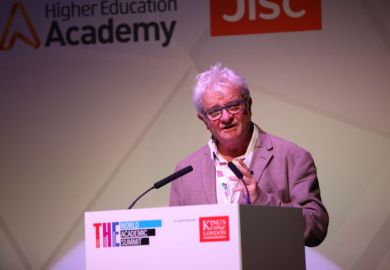New independent research institutes focused on emerging technologies such as artificial intelligence and synthetic biology could make a significant contribution to British research, a long-awaited review into UK research structures has suggested.
In a report published on 6 March, Sir Paul Nurse, director of the Francis Crick Institute, notes there are currently more than 50 research institutes operating in the UK – including the Medical Research Council’s Laboratory of Molecular Biology in Cambridge, the John Innes Centre in Norwich and the Faraday Institution for battery technology at Harwell, near Oxford – with researcher numbers ranging from about 100 to 1,500, and funding derived from various sources including research councils, industry, charities and government.
However, Sir Paul, a former Royal Society president and Nobel laureate, insists that “given the potential and high quality of the best run and funded institutes and units, funding organisations such as UK Research and Innovation should regularly consider whether new institutes or units are required”.
“Possible new institutes could, for example, be dedicated to research into climate change and its mitigation, antimicrobial resistance, synthetic biology, and artificial intelligence,” he explains, adding that this diversification could “enhance the RDI [research, development and innovation] landscape and the UK research endeavour”.
“Research institutes and units play a unique, beneficial role in the UK’s RDI landscape and this sector should be expanded to contribute more to the UK’s RDI capability,” concludes Sir Paul, whose 2015 review of UK research led to the formation of UK Research and Innovation, the umbrella body covering the country’s research councils.
Sir Paul noted the strong tradition of independent research institutes in the US, where a number of autonomous laboratories have been supported by the Department of Energy, the National Institutes of Health and the Howard Hughes Medical Institute, a medical research charity. Similar investments have now been made in China and South Korea, while France has almost quadrupled its number of stand-alone labs to 200 over the past decade, he notes.
A number of research institutes had also been created in the UK in recent years but Sir Paul’s report says the governance and operation of these organisations should be reviewed. For instance, when institutes were fully owned by UKRI, their scientific leadership and administrative posts were subject to government salary rules, which was “a serious problem for recruitment and retention of the best researchers”.
Different administrative and financial problems emerged when institutes were embedded in universities, says Sir Paul, who adds that five recently created research institutes – the Alan Turing, Rosalind Franklin, Henry Royce and Dementia Research Institutes, and the Tyndall Centre for Climate Change Research – had “reported significant difficulties related to how they were set up and now operate, principally due to poor governance and ineffective funding arrangements”.
“These and other institutes should be ‘rescued’ by giving them longer term end-to-end core funding [ie, fully-funded research], investing in infrastructure, and reformulating their governance to give them proper independence and distinct identities,” recommends Sir Paul, who claims this “quick win” would lead to their “re-invigoration, [and then] they could then be relaunched and rebranded”.
A proposed institute for biomedical research in Edinburgh currently under discussion should also be given greater independence because this “has the potential to be an exemplar of how a large-scale research endeavour could be set up, but may be in danger of becoming a conventional compromise trying to satisfy too many different stakeholders”, he adds, saying it should be established as “an independently run, focused high-quality discovery research institute located on a single site”.
On university research, Sir Paul draws attention to the need for “end-to-end funding” of research in which direct research costs, plus technical, administrative and laboratory costs, are all funded, noting that the “present funding arrangements do not provide adequate support for all these components, and need to be overhauled to ensure that they do so”.
“The present underpinning of UK university research by other commercial income sources, notably fees paid by international students, is valuable, but care is needed as such sources are not always reliable and sustainable,” he says, recommending that “government should take account of the true cost of ‘end-to-end’ research activity…[and] should review and when necessary reform competitive and response-mode grant funding, QR (and devolved administration equivalents), and full economic costing, and replace them with improved mechanisms.”
Register to continue
Why register?
- Registration is free and only takes a moment
- Once registered, you can read 3 articles a month
- Sign up for our newsletter
Subscribe
Or subscribe for unlimited access to:
- Unlimited access to news, views, insights & reviews
- Digital editions
- Digital access to THE’s university and college rankings analysis
Already registered or a current subscriber?










